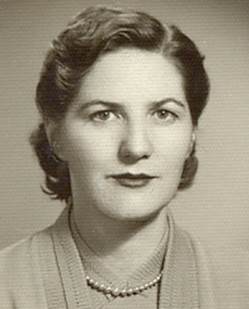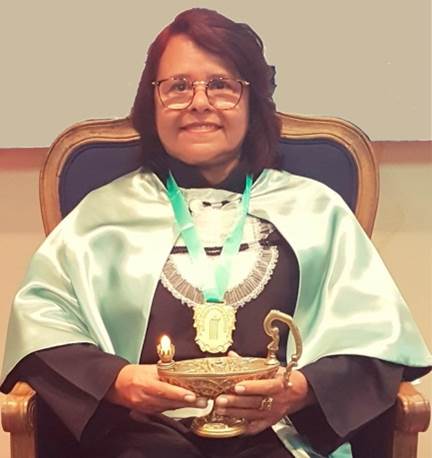




Chair 4: Anayde Corrêa de Carvalho, RN. Ph.D.
Patron: Anayde Corrêa de Carvalho, RN. Ph.D.
Researcher: Almerinda Moreira, RN, Ph.D.
I chose to occupy the chair whose patroness is Anayde Correa de Carvalho, because I acknowledge her as an icon, one of the pioneers of Brazilian Nursing, especially in Nursing History research.
Anayde Correa de Carvalho was born in Ribeirao Preto, on July 20, 1916, daughter of Pedro Correa de Carvalho and Elza Morandini de Carvalho, of German descent, and therefore very rigid in the education of her seven children: Augusta, Mariana, Anayde, Amália, Manoel Francisco, Maria and Pedro. She spent her childhood at her father’s farm and studied at the Santa Ursula College. After taking her elementary education at this college, she completed what used to be called the standard course for the preparation of primary education teachers and taught for some time at a primary school. About her choice for Nursing, she said in an interview once that she was driven by her sister, Amália Correa de Carvalho, who was already taking the course and said that she liked the course very much. Her sister was very active in nursing. When she returned home, she praised the Nursing school that much that her father encouraged her to take the course as well. She said: “I went and liked the course very much”.
She graduated in the fourth class of the University of São Paulo School of Nursing (EEUSP), in 1949. When she studied at EEUSP, she lived at the school, as an intern. She started her professional life at the nursery of the Hospital das Clínicas of the University of Sao Paulo School of Medicine, where she became the head of the Surgical Center of the same hospital, from where she was summoned, in 1950, to become the Deputy Director of the School of Nursing in Bahia, founded in January 1946. That school is currently part of the Federal University of Bahia (UFBA). In 1951, after the departure of dean Jandyra Coelho, Anayde became the school dean, where she worked for two years, when she returned to the USP School of Nursing. She taught the subject Medical Nursing but was mostly active in the administrative-technical sector of the school, taking care of the work scales, the teachers’ payments and so forth.
In 1952, she traveled to the United States on a Kellogg Foundation scholarship to study at Teachers College, Columbia University, New York, returning to Brazil in 1954 to take on technical coordination duties at EEUSP. At the same time, she also served as the President of ABEn-Sao Paulo, from 1956 to 1958. She worked hard for ABEn and for the Brazilian Nursing Journal. As the technical coordinator of EEUSP, she was invited, in 1962, to participate in a seminar for deans and faculty members of graduate courses in Nursing, in Jamaica, for 20 days, sponsored by the World Health Organization. In 1963, she returned to the United States for internships and observation visits at American nursing schools, on a scholarship from the Kellogg Foundation. That was the necessary preparation to better ground the graduate program in nursing service administration, which was offered at EEUSP since 1959.
She was very influential in the preparation of several nursing generations, especially in nursing management. Anayde Correa de Carvalho, who left as a legacy a book entitled “Brazilian Nursing Association – Documentary - 1926-1976”, published in 1976, 514 pages (Carvalho, 1976). In describing the first fifty years of history of this organization, the result of five years of research, she carefully reproduced the very history of Brazilian Nursing and the leaders who forged the destinies of the profession in the period studied.
She reconstructed the history of the Brazilian Nursing Association. It is worth noting that the story of ABEn’s history, of the profession and the professionals at that time, contained in her work, helped to outline the identity construction of today’s Brazilian professional nursing. The first edition of her book was entirely donated to the Brazilian Nursing Association (ABEn), and is considered a classic, especially in Nursing history, being a basic book for nursing researchers. ABEn published the second edition of this work in 2006. The content the author was responsible for was left unchanged though, adding a statement by Prof. Ieda de Alencar Barreira, Ph.D. on the back cover (Barreira, 2006), and a Note on the Author at the end of the book, written by Prof. Taka Oguisso, Ph.D. (Oguisso, 2006).
Anayde Correa de Carvalho aimed to produce knowledge in Brazilian Nursing. With her dedicated professional life, she is one of the most active pioneers who is still working, although almost always invisibly, because she preferred to work for nursing behind the scenes, offering silent support. She continued teaching at EEUSP in the subject Administration applied to Nursing, where she was chosen several times as the class spokeswoman. She retired in 1979. In an interview granted in 2013, she said: “nursing professionals in the care area need to focus more on proper patient care, which is the main target of the profession. And the teachers should teach and set an example of how to care for patients with the proper science, art and technique, without neglecting the ideal that should permeate all nursing actions”.
Pursuing her career, she was one of the promoters of the creation of ABRADHENF( 2010), she was our first Distinguished Member and died in her home in the city of Ribeirao Preto on 2019 February 11, at the age of 102 years. My tribute to Anayde Correa de Carvalho, whose chair I have the honor to occupy today.
Text by Almerinda Moreira, RN, Ph.D.
3
Her academic career began at the School of Nursing and Obstetrics Alfredo Pinto School of Nursing (1975), with a Master’s Degree in Nursing from the Federal University of the State of Rio de Janeiro (1990) and a Doctorate in Nursing from the University of Sao Paulo (2003).
I highlight her performance as a researcher in the area of Nursing History and as Director of the Nursing School Alfredo Pinto/UNIRIO from 2012 to 2016.
In addition, she is a Founding Member of LAPHE-Nursing History Research Laboratory/EEAP-UNIRIO and Laboratory for Nursing History Studies (LAESHE), from EERP-USP, which, in addition to her postgraduate studies, give examples of networking and cooperation efforts.
Her space within ABRADHENF has also evolved. She started as a founding member, Director of Social Communication in the 2010-2014 mandate and 1st Secretary in the 2014-2016 mandate, currently holding the presidency until 2020. Her many contributions to the field of Nursing History research resemble the chair she has chosen, called Anayde Correa de Carvalho, great lady of the History of Brazilian Nursing and the Brazilian Nursing Association and who recently, while still among us, was a great enthusiast and sponsor of ABRADHENF, and just like Dr. Amerinda Moreira, an educated, brilliant woman who was hardly attracted to the spotlights or status.
Her master’s thesis and doctoral thesis filled important gaps in the Brazilian Nursing historiography and added important value to the history of the first Nursing School in Brazil, currently Alfredo Pinto Nursing School. In addition, she organized books and produced book chapters in didactic materials and articles, which have strongly contributed to the teaching of Nursing History throughout Brazil.
Thus, the granting of the title of ABRADHENF Academic Member to Dr. Almerinda Moreira values this important researcher in the area of Nursing History and, at the same time, adds to the hall of ABRADHENF academic members another brilliant researcher, who will continue contributing to the academy.
Text by Luciana Barizon Luchesi RN, BA, Ph.D.